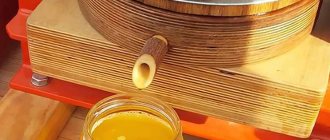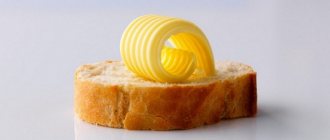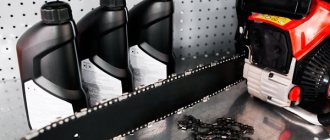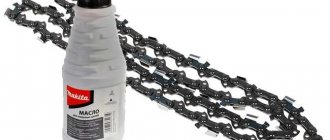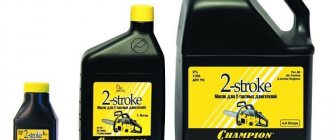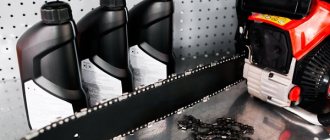Cold pressed
The product is obtained from annual sunflower seeds by cold or hot pressing and extraction. Cold-pressed sunflower oil is also called pressed oil. It can also be obtained at home. Hot pressing and extraction are carried out in oil mills. The production process consists of several stages:
- preparation of raw materials (cleaning seeds from debris, hulling, separating kernels and husks);
- crushing kernels in rollers, obtaining “mint”;
- squeezing mint with a press;
- dissolving the pulp obtained after squeezing using organic solvents;
- distillation (extraction) of the oily substance from the solution and the solid residue (micelles and meal) in the extractor.
The pressed derivative is subjected to sedimentation or purification from accompanying impurities (refining). There are several cleaning methods (chemical, physical, mechanical), as a result of which the color, smell, density and other qualities of the product change.
Unrefined oil has a rich dark yellow color.
In the production of cold-pressed sunflower oil, heat is sometimes used. Seed kernels passed through rollers, the so-called. mint, placed in roasting pans and subjected to heat treatment at a temperature of 45°C. Next, the seed juice is released under high pressure, which is then sent for sedimentation and storage.
When cold pressing, it is not allowed to use any chemical treatment, add preservatives or exceed temperatures above 45°C. Excessively overheated sunflower raw materials will give the product a burnt taste and smell, and will deprive it of many useful components. Sometimes manufacturers raise the heating temperature of raw materials to 90°C. With hot pressing, the pressing process is accelerated and the yield of the product increases, while with cold pressing, 20-30% of the oil component remains in the cake.
Unrefined cold-pressed varieties have a pleasant taste and aroma of roasted seeds; the oily substance gently coats the mouth and throat when swallowed.
The presence of the inscription “Extra Virgin” on the label is a guarantee that this is an unrefined, cold-pressed product.
Production of vegetable oil in large volumes (production workshop)
The next step in expanding home oil production is the organization of a full production cycle workshop. This type of business requires large investments, and the sale of the finished product requires quality certificates, which in the Russian market is almost impossible without registering a legal entity.
Business registration
Depending on the number of founders, the form of their responsibility and the procedure for obtaining the expected profit, the organizational and legal form of the enterprise is selected. When registering, you will need to decide on the main and additional classifiers of the type of economic activity, the tax regime and the possibility of introducing simplified tax regimes.
Choice of legal form
From the point of view of the possibility of selling products in large retail chains, the availability of a bank loan and the possibility of expanding or reselling a business, the form of a limited liability company is more suitable.
The founder can be either one person or partners who share profits in proportion to the size of participation in the company. The state fee for registration is 4,000 rubles, the minimum authorized capital is 10,000 rubles. Registration takes 5 working days.
OKVED codes
The production of oils, like other food products, falls under class 10 of the OKVED-2 system, subclass 10.4. Codes relevant for this type of production are presented in the table.
OKVED classification codes for the production of vegetable oils
Production technology and necessary equipment
The full production cycle allows us to produce about ten types of products, not counting the possibility of expanding the range through the use of seeds of various plants: raw unrefined oil, from roasted seeds, refined oil, technical oil, fuel briquettes from husks, rounds of husks, pressed fuses, etc.
Technological process of industrial production of vegetable oil
The most complete technological process includes the following stages and equipment:
- Sifting and calibrating seeds on a separator. Depending on the quality and purity of the raw materials used, seeds can be contaminated not only with small stones, sand and weeds. Corn grains, oilseed seeds, oxidized open sunflower seeds, when pressed, give the oil a sour and bitter taste. In the case of storing raw materials, this also reduces its shelf life, increases humidity and leads to self-heating of the seeds.
The aerodynamic separator carefully sorts raw materials using air flows created by a pressurized fan inside the machine. The SAD-15 separator calibrates up to 7 tons of seeds per hour, requires loading by an operator; one person is enough to work on the line.
| Name of equipment | Aerodynamic separator SAD-15 |
| Fine cleaning performance | 7 t/hour |
| Power consumption | 7.8 kW |
| Weight | 538 kg |
| Number of staff | 1 person |
- Cleaning of shells and peeling of seeds is carried out using a seed huller. The continuous rotary mechanism can operate three shifts per day. HPX-4-01 machines with a capacity of 80 tons/day are produced for oil production enterprises.
| Name of equipment | Seed crusher NRKh-4-01 |
| Performance | 80 t/day |
| Power consumption | 11 kW |
| Weight | 1750 kg |
| Number of staff | 1 person |
The result is husks and kernels for grinding.
Briquetting of seed husks is carried out using a screw extruder press; the technology for manufacturing biofuel briquettes does not imply the use of any fastening substances other than water. The PBE-325 screw press is suitable for the productivity of the seed grinder.
| Name of equipment | Screw press PBE-325 |
| Performance | 5 t/hour |
| Power consumption | 30 kW |
| Weight | 1250 kg |
| Number of staff | 1 person |
Biofuel briquettes from husks
- The grinding of hulled seeds is carried out in roller machines. Oil from crushed seeds is extracted more easily and with less energy. A seed roller mill differs from a flour mill by the ability to adjust the gap to grind crops of various sizes. The SV-400/4 machine allows you to grind from 50 tons of raw materials per day. The output is a semi-finished product in the form of a flattened seed - mint.
| Name of equipment | Roller machine SV-400/4 |
| Performance | From 50 t/day |
| Power consumption | 30 kW |
| Weight | 9800 kg |
| Number of staff | 1 person |
- Warming up the mint with steam or frying. To save money from purchasing a fryer, in some industries this link is removed from the technological chain. The seeds are steamed if cold pressing is planned. The oil from the roasted seeds is extracted more efficiently and has a bright aroma and color. To roast 60 tons of mint per day, you can consider the Zh-60 roaster.
| Name of equipment | Roaster for seeds Zh-60 |
| Performance | Up to 60 t/day |
| Power consumption | 30 kW |
| Weight | 11600 kg |
| Number of staff | 1 person |
- Spin. The oil press squeezes out the flattened dry mint, resulting in crude oil and pulp. There are machines that automatically send the crop for repeated compression, but this function significantly affects the price of the unit. Screw press for processing 40 tons of seeds per day MP-1500.
| Name of equipment | Screw press MP-1500 |
| Performance | 40 t/day |
| Power consumption | 30 kW |
| Weight | 4200 kg |
| Number of staff | 1 person |
The waste from this stage - the waste - should be processed while the temperature from the pressure is maintained.
- Filtration by settling or centrifugation. To obtain a high-quality product, as well as to reduce the volume of fuses, it is recommended to leave the oil for at least a day. Next, filtering is performed. Continuous cleaning in large industries is carried out using centrifugal self-cleaning filters. The result is unrefined oil and fuzz. The U10-FC centrifuge removes up to 4 tons of oil per hour from mechanical impurities.
| Name of equipment | Centrifugal filter U10-FC |
| Performance | 4 t/hour |
| Power consumption | 18.5 kW |
| Weight | 1800 kg |
| Number of staff | 1 person |
Sunflower fuses
The fuses are boosted in a drum-type fusodushka, the result is technical oil, which can be sent for further purification, but it is more rational to make drying oil from it or sell it to a paint shop. The Danker sludge crusher allows you to process up to 600 kg of sludge per hour and is equipped with a control panel.
| Name of equipment | Danker drum press |
| Performance | 600 kg/hour |
| Power consumption | 1.5 kW |
| Weight | 175 kg |
| Number of staff | 1 person |
- Oil refining is carried out in stages. To begin with, the product after filtration is treated with hot water at a temperature of 65-70 degrees Celsius. This process is called hydration and serves to remove phosphatides from the product and improve its clarity. Phosphatides in the product cause it to become cloudy and precipitate.
Next, the product is neutralized: the heated oil reacts with alkali, which clears it of free fatty acids that affect the taste. The result is refined oil.
- Deodorization. The process of removing pigment from a product, which often enters a refining line. The result is deodorized refined oil. It is light, transparent, without carotenoids.
The equipment for the refining and deodorization workshop with a capacity of 45 tons/day consists of the following components.
| 1. Refining column with a volume of 9000 l with a stirrer | 1 PC. |
| 2. Refining column volume 11000 l with stirrer | 1 PC. |
| 3. Pump NSh-100 | 2 pcs. |
| 4. Stainless steel plate heat exchanger (refining) | 2 pcs. |
| 5. Drying column 9000 l with stirrer. | 2 pcs. |
| 6. Heat exchanger (to the dryer) stainless steel plate | 1 PC. |
| 7. Water ring vacuum pump (to the dryer) VN1 | 1 PC. |
| 8. Frame filter (after dryers) | 1 PC. |
| 9. Pump NSh-100 (for frame filter) | 2 pcs. |
| 10. Deodorization unit with a capacity of up to 50 tons per day Stroypischemash | 1 PC. |
| 11. Washing filters - 2 pcs. 1 ton and 1 piece - 3 tons AMO | 3 pcs. |
| 12. Gas-diesel boiler Booster 3t/h steam | 1 PC. |
| 13. Grease traps | 2 pcs. |
| 14. Soap container | 1 PC. |
| 15. Overpasses, stairs, pipelines, cranes | |
| 16. Automatic control panel for the Stroypischmash installation | 1 PC. |
| 17. Flow meters | 3 pcs. |
| 18. Oil freezing tanks with water jacket 4 m3, 8 m3 | 2 pcs. |
| 19. Capacity of citric acid solution | 1 PC. |
The number of personnel on the line is 6 people.
Refining and deodorization workshop
- Filling into polyethylene bottles is automated and allows you to fill containers with a capacity of 0.5 to 1.5 liters.
- The labeling machine is combined with an inkjet printer to print and apply labels to bottles. For packaging, a conveyor and an automatic packer are required. All this is part of a bottling line with a capacity of 6 thousand bottles per hour.
| Water cooler | 1 PC. |
| Blowing machine 3000 b/h | 2 pcs. |
| Compressor station 30 atm. | 1 PC. |
| Mold 0.5 – 1.5l | 2 pcs. |
| Monoblock filling with capping | 1 PC. |
| Labeling machine 6000 b/h | 1 PC. |
| Dating inkjet printer with a productivity of 8000 bph | 1 PC. |
| Automatic packer with thermal tunnel up to 1000 packs/h | 1 PC. |
| Conveyor 10 m | 1 PC. |
| Oil and moisture separating filter | 1 PC. |
The line is serviced by 6 people per shift.
Automatic oil filling line
Cost of equipment
Equipment is selected after designing the production line. At this stage, it is advisable to imagine the initial assortment of the enterprise, the degree of automation of production and the procedure for disposal or recycling of waste.
With a planned capacity of about 800 tons/month, it is rational to purchase an automated line, fully equipped for the extraction and refining process. For smaller production volumes, it is more profitable to purchase equipment separately.
| No. | Technological process | Name of equipment | Cost, thousand rubles | Output product |
| 1 | Initial purification of raw materials | Separator SAD-15 | 150 | Seeds cleaned of dust and impurities |
| 2 | Peeling | Seed crusher NRKh-4-01 | 750 | Seed kernels, husks |
| Screw press PBE-325 | 778 | Biofuel briquette | ||
| 3 | Seed grinding | Roller machine SV-400/4 | 2000 | Mint - flattened seed |
| 4 | Heat treatment | Roaster Zh-60 | 900 | Roasted sunflower seed |
| 5 | Oil extraction | Screw press MP-1500 | 2500 | Unrefined butter, flour |
| 6 | Cleaning oil from impurities | Centrifugal filter U10-FC | 200 | Unrefined oil, fuz |
| Danker drum press | 50 | Technical oil, shovel fuzz | ||
| 7 | Refining | Refining and deodorization line | 20000 | Refined oil, not deodorized |
| 8 | Deodorization | Refined deodorized oil | ||
| 9 | Bottling | Filling and labeling line | 2500 | Oil poured into bottles with label |
| 10 | Label sticker | |||
| Helper Processes | Pneumatic loader | 1500 | ||
| Scales, buckets, shovels | 300 | |||
| Total: | 32378 | thousand roubles. | ||
Selecting a raw material supplier
When choosing a supplier, you need to focus not only on the low price, but also on the quality of raw materials and delivery conditions. If heavy transport is not available at the production site, the supplier must ensure an uninterrupted supply of seeds on its own or through a transport company.
For each item there must be at least three suppliers to provide insurance in case of a bad harvest, quality or transport problems with the seller.
With a daily loading of 75 tons of unpeeled seeds into the separator, the volume of purchased raw materials will be more than 1800 tons per month, which allows you to purchase directly from farms, bypassing distributors.
When purchasing, you should pay attention to such indicators as impurities of litter and oil, acidity, moisture, and oil content. The average market price per ton of sunflower seeds is 15 thousand rubles, the minimum is 13 thousand rubles. The bulk of suppliers are located in the Krasnodar region and the Volga region.
Selection of production premises
Since the oil and fat industry is a food industry, the premises of the enterprise must meet the strict requirements of the SES and fire departments. The workshop must be clean, bright, with a correctly calculated electrical load, clean water supply and sewage system. Standardly, for daily processing of 75 tons of raw materials, 1200 sq.m of workshop area and at least 2500 sq.m of warehouse space are required. Seeds are stored in bulk, with a supply for 1.5 months of uninterrupted operation, so storage areas must be dry and covered.
Separate premises are also needed for storing finished products - both the oil itself and waste products. Household premises must comply with labor protection requirements.
Recruitment and payroll
Production requires both highly qualified personnel, workers and craftsmen. The number of management personnel and technologists is constantly 10 people or more. Workers are hired based on production capacity. The work schedule is variable.
| Job title | Number of persons | Salary, thousand rubles | Total, thousand rubles |
| Office | 4 | 70 | 280 |
| Technologists | 6 | 50 | 300 |
| Storekeepers | 10 | 25 | 250 |
| Masters | 14 | 45 | 630 |
| Workers | 68 | 35 | 2380 |
| Total | 100 | 3840 |
Personnel can be recruited gradually, as production volumes increase and the most optimal operating mode is established based on market needs.
Use of production waste
Income from the sale of produced oil is not the only component of the profit of a large enterprise.
Selling waste products makes the creamery more efficient and profitable. Typically, the cost of the final product is reduced by the amount of sales of production by-products, thereby reducing its price for the consumer.
Briquettes made from husks are environmentally friendly fuel, due to which you can organize the economical operation of a fryer, and also sell them to other industries, for example, brick factories.
Highly purified sunflower cake is sold to confectionery shops for the production of halva and sweets. If this product is not sufficiently purified, it is hot pressed and sold to animal feed manufacturers.
Tank sludge is passed through a fuel press, providing additional volumes of oil for production. Most often, such oil is not sent to the filtration line, but is sold as technical oil to paint factories and for the production of drying oil.
Sales market
Due to the opaque situation in the field of GOSTs for oil and fat production (especially in terms of squeezing raw oil), it is easier to develop your own specifications to confirm the quality of the products. Technical conditions are registered and samples are submitted to the laboratory according to them. If the samples meet the standards, the company receives a quality certificate for its products. If you have such a certificate, the oil can be sold in large retail chains, retail stores, and market pavilions.
It is also rational to organize a specialized retail store during production. Such a retail outlet should offer the most complete range of products. Consumers of maca and fuse products are large farms engaged in livestock breeding. You should pay attention not only to Russian enterprises, but also to non-CIS countries. Pure sunflower oil is in great demand in countries with little presence of this crop in crops.
Specialized oil store
Calculation of initial investment
It is impossible to calculate the profitability of production without assessing the initial investment in the business. The cost of organizing a production line with a loading of 75 tons of crude raw materials per day will amount to 43 million rubles.
| Capital Expenditures | Amount, thousand rubles |
| Equipment purchase | 3 2378 |
| Delivery, installation (30% of the cost of equipment) | 9 700 |
| Indoor work | 800 |
| Paperwork | 100 |
| Total | 43 000 |
To organize production in the first month of work, 37 million rubles will be needed.
| Turnover expenses | Amount, thousand rubles |
| Rent 3700 sq. m. | 1200 |
| Wage | 3840 |
| Taxes | 2000 |
| Raw materials | 30 000 |
| other expenses | 300 |
| Total | 37 340 |
Calculation of profitability and payback
When calculating payback, the situation with 100% sales of products is taken into account, excluding damage, defects, and loss as a result of improper storage or transportation.
Output per month is calculated from the percentage of yield per ton of sunflower and the daily rate of raw material loading.
| Name | % yield | Output, t/day | Output, t/month |
| Oil output | 42,21 | 31,66 | 949,8 |
| Cake yield | 35,55 | 26,66 | 799,88 |
| Husk output | 17,04 | 12,78 | 383,40 |
| Output of litter | 0,81 | 0,6 | 18,23 |
| Moisture loss | 4,39 | 3,29 | 98,78 |
| Total | 100 | 75 | 2250 |
Based on wholesale selling prices, the monthly revenue will be:
| Product type | Wholesale price, thousand rubles/t | Revenue, thousand rubles/month |
| Sunflower oil | 35 | 33 243 |
| Dry poppy seed | 8 | 6399 |
| Biofuel husk | 3,5. | 1342 |
| Total | 40 984 |
Then the net profit will be 40,984-37,340=3,644 thousand rubles, and the return on capital investments will be 43,000/3,644=11.8 months.
How is it different from refined?
When starting to cook, housewives should understand the difference between refined sunflower oil and unrefined sunflower oil. The purified product has no smell and no distinct taste of seeds, so when dressing salads and canned food, when frying and adding to dough, it does not affect the taste and smell of dishes. Refined varieties last longer and are cheaper.
The difference between refined and unrefined sunflower oil is in the chemical composition. During the cleaning process, many useful substances are lost, which reduces the healing properties.
In terms of beneficial qualities, unrefined sunflower oil is not inferior to olive, soybean, and corn oil.
Rely only on yourself
We studied the issue of state support. But it seems to me that so far assistance to entrepreneurs is provided only in words.
We managed to send our oil to the Kremlin and the Ministry of Health - we'll see what comes of it.
We tend to believe more in venture capital investments. Now we have an idea to post on the Boomstarter site. I know real examples of manufacturers who were able to raise money there to expand production. We pinned great hopes on the SKB Kontur project “I am a businessman.” I believe in such support more than in the hypothetical benefit of the state. Although, it seems to me that this is a very necessary thing, because there are fewer and fewer industries. Everyone wants minimal costs and maximum profit; no one wants to do anything with their hands.
Every time I interact with customers in the store, I know I'm doing the right thing. Now, if the state even just talked about young entrepreneurs, about the difficulties they face, how they cope with them, and all this was shown on TV instead of some criminal action films, such support would be more valuable than money. Open and honest information about business is very important now.
Personally, my desire to get into food production appeared after I read the blog of Mikhail Peregudov, the founder of the Food Party. He was professionally involved in marketing and PR. His principle is maximum transparency, so he calmly writes about his income and how he went broke. This is a story from a living person, which is why I want to read his blog.
Compound
Unrefined sunflower oil contains a large amount of fatty acids.
Their average molecular weight is about 290 atomic units. A large share belongs to omega-9-oleic (25-40%) and omega-6-linoleic (45-60%) acids. The unrefined product also contains palmitic, stearic, myristic, arachidic, and omega-3-linolenic acids. Unrefined varieties are famous for containing vitamins that are preserved during the cold pressing process. Thus, α-tocopherol (vitamin E substance) is contained in amounts up to 70 mg/100 g. In olive oil, this figure is up to 24 mg/100 g.
It is a powerful neuroprotector and antioxidant; it protects cell membranes from damage due to oxidation, stabilizes mitochondria, regulates metabolic processes and immunity, and reduces the risk of malignant tumors. Another important vitamin in unrefined oil is K. The whole truth about flaxseed oil.
Benefit for health
The benefits of unrefined sunflower oil are due to its composition. The combination of vitamins and fatty acids allows it to have the following effects:
- regulate fat metabolism, accelerate metabolism, as a result of which “bad” cholesterol and excess weight are reduced, and the regeneration of muscle and bone tissue improves;
- improve the functioning of the cardiovascular system and brain (prevents degenerative changes, memory loss), strengthen the walls of blood vessels;
- reduce blood viscosity and the risk of blood clots;
- help form cell membranes and nerve fibers;
- improve liver function and digestion, eliminate constipation;
- strengthen immunity;
- prevent premature aging;
- strengthen hair and nails;
- improve the functioning of the endocrine and genitourinary systems.
Unrefined sunflower oil has not only benefits, but also harm if consumed immoderately.
Which is healthier – refined or not?
Traditionally, the question of which sunflower oil is healthier, refined or unrefined, is answered by giving preference to the latter because of its greater naturalness. However, not all so simple.
The specific taste and smell are created due to the presence of impurities in the product - pigments, odorants, soaps, and natural contaminants. When used systematically, these substances can have a negative effect on the body.
In addition, the answer to the question of which sunflower oil is better, refined or not, depends on the purpose of its use. For frying, baking and canning with heat treatment, purified varieties are preferable. They do not lose quality when heated and do not interfere with the taste and smell of cooked food. In addition, the shelf life of unrefined oil is much shorter. If the housewife stores food for a long time, it is better for her to prefer purified varieties. How to cook fried bananas?
Is treatment with oil effective?
Treatment with unrefined sunflower oil should be agreed with a doctor after a preliminary medical examination.
An important point in any therapy is dosing. In an amount of 20-50 g (up to 3 tablespoons), the unrefined product has a therapeutic effect; in a larger dose it can have the opposite effect. There are many recipes for healing mixtures of traditional medicine with the addition of olive, pumpkin or sunflower oil. For medicinal products, it is intended to use only unrefined product. In some cases, it is useful to simply drink a spoonful of oil.
How to use?
To avoid harm to health, you should know how to use unrefined sunflower oil. You should not consume more than 20-50 g per day, so as not to upset the body’s lipid balance and gain excess weight. To achieve a healing effect, use must be regular.
Since oil contains vitamins that are easily destroyed when heated, there is no point in using an expensive healing product when frying, baking and canning. Although there are recipes that recommend adding a lot of oil to the jar before sealing without subsequent sterilization. The most common and correct way to use an unrefined product is to dress vegetable salads. Flaxseed oil for weight loss.
Castor
Cold-pressed castor oil is extracted from the castor bean plant. In appearance, it has a light yellow tint that does not form a film and does not dry out. It has a number of valuable properties. It is very often used in cosmetology, as it perfectly nourishes, moisturizes and protects the skin, smoothes wrinkles and prevents premature aging. It has excellent whitening properties and helps in the fight against freckles. Cold-pressed oil also wonderfully cares for hair, gives it shine and strengthens it. Well stimulates the growth of eyelashes and eyebrows, an indispensable remedy for dandruff.
Used for deep cleansing of the gastrointestinal tract. It is considered the simplest assistant for weight loss, as well as for improving metabolism.
Is it possible to fry?
When choosing culinary recipes, housewives decide whether it is possible to fry in unrefined sunflower oil.
If there is no other option, then as an exception, once, it is possible. It should be taken into account that the vitamins will not be preserved, the taste and color of the oil will change, and the taste properties of the fried dish will also change. Some types of fish do not combine with the taste of unrefined varieties, and frying vegetables will ruin the taste of the soup. Cooks need to clearly understand why they cannot fry in unrefined sunflower oil all the time. Substances dissolved in oil, when heated, change their structure, are destroyed, and turn into toxins and carcinogens.
Sales Features
It turned out that it was easiest to negotiate cooperation with health food stores. All meetings, as a rule, led to a positive result after the tasting. Since sellers understand oils, they have something to compare with.
With large stores everything is more complicated. We have experience communicating with one large supermarket chain. I can say that I have never encountered a more strange situation. We submitted samples on December 27, 2015 and have yet to receive a response. They haven’t even tried the oil, they say they don’t have time. We wrote letters and called. Everything is decided there by category managers, each of whom is a professional in his field. At the same time, the company declares that it needs a wide range of quality products.
The first hypermarket in which we will be presented is “Season” on Pionerskaya. I talked with the general director, he was satisfied with everything, and the decision was made quite quickly, in 15 minutes. Most likely, we will have to help the store with promotion and tasting to introduce customers to the new product. But I am sure that we will succeed.
We have already sold 1,000 bottles, people from the regions are already starting to find us, bloggers who write about healthy eating are offering to organize group purchases without extra charges.
Markups, especially in Moscow and St. Petersburg, are often very large. We have had experience communicating with stores that want to make extra profits by tripling the purchase price. But I believe that everything should be within reason.
Possible harm from consumption
The main point limiting the dose of unrefined varieties is their high calorie content (890 kcal/100 g) and the presence of a large amount of fat (99.9 g/100 g). It is not advisable to eat more than 3 tablespoons per day. Otherwise, the fat balance of the body, the functioning of its internal organs and systems will be disrupted, and weight will increase.
The frying process can produce toxins that are harmful to the body. People suffering from chronic diseases (hypotension, blood incoagulability, gall bladder problems, etc.) should consult a doctor about the permissibility of consuming oil or reducing doses. With some anomalies of the body, the positive properties of the product turn into negative ones. There are cases of allergies to sunflower oil ingredients. In addition, an expired product will cause harm.
IMPORTANT! It is not recommended to use unrefined sunflower oil in the diet of children under 2 years of age. This is a biologically active substance that can disrupt the formation of the child’s immune system.
Shelf life and storage
The shelf life of unrefined sunflower oil, especially those that have not undergone mechanical refining, is quite short. It easily produces sediment and a cloudy color.
You should clearly remember how long unrefined sunflower oil is stored. After opening the package, the product should be used within a month. It should be stored in a glass container in a dark place at a temperature range of 5-25°C. If the color, smell or taste have changed, you should stop using the product. How to properly store bananas?
Review Reviews
Reviews of unrefined sunflower oil confirm that consumers are very fond of this product, which smells appetizingly like seeds.
Many people are not bothered by the fact that dishes acquire a specific taste and aroma. Another category of consumers prefers a culinary ingredient with a neutral taste and smell. Those who use the unrefined variety for frying say they don't spatter as much as the refined variety and the flavor is moderately pleasant in the finished dish. While cooking, the smell spreads throughout the house - this is an aroma that is not for everyone. More often, consumers season salads and boiled potatoes with unrefined oil.
Women use this product for cosmetic purposes for dry skin. For example, it helps well with corns. If you lubricate your feet with unrefined oil, wrap them in film and put on socks, your feet will be in good condition in the morning. Consumers complain that it is rare to find unrefined varieties on sale with a lively aroma of roasted seeds and a natural taste. Find out what the benefits of flaxseed oil are for women here.
Start-up capital
Initially, a little more than a million rubles were invested in the business. We thought this investment would pay for itself in three years, provided we sold at least 1,000 bottles a month. But theory rarely coincides with practice, which is why 99% of business plans do not go according to the written script. This happened to us: the first months of work showed that we overestimated our capabilities. At first we were in the red. Now we can already see the light at the end of the tunnel, we are carrying out additional calculations.
I understand that the manufacturer’s profitability rate, as a rule, is around 20%, and super-profits for the manufacturer are possible only when he can make his production waste-free. We are moving towards this, although we previously thought that we could cope only by selling oils. But we have a bonus: since we produce oil using gentle technology, the output is an innovative product. Since we press on the seeds, we do not break them; our sesame looks like a whole one, only it becomes twice as thin, while maintaining its nutritional value. Almost all the calories go with the oil, and the result is a dietary low-fat product. In the long term, we plan to do something with it, but it is not possible yet, so for now we simply give these raw materials to manufacturers who make healthy food in the form of bars and natural sweets.
We also began packaging defatted seeds in small bags and delivering them to stores, explaining to consumers what can be done with these raw materials. For example, I bake delicious and healthy cookies.
